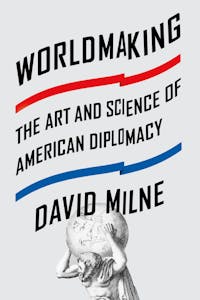Worldmaking
The Art and Science of American Diplomacy
 Download image
Download image
ISBN10: 0374536392
ISBN13: 9780374536398
Trade Paperback
622 Pages
$25.00
CA$31.50
Worldmaking is a compelling new take on the history of American diplomacy. Rather than retelling the story of realism versus idealism, David Milne suggests that U.S. foreign policy has also been crucially divided between those who view statecraft as an art and those who believe it can aspire to the certainty of science.
Worldmaking follows a cast of characters who built on one another’s ideas to create the policies we have today. Woodrow Wilson’s universalism and moralism led Sigmund Freud to diagnose him with a messiah complex. Walter Lippmann was a syndicated columnist who commanded the attention of leaders as diverse as Theodore Roosevelt, Lyndon Johnson, and Charles de Gaulle. Paul Wolfowitz was the intellectual architect of the 2003 invasion of Iraq—and an admirer of Wilson’s attempt to “make the world safe for democracy.” Each was engaged in a process of worldmaking, formulating strategies that sought to deploy the nation’s vast military and economic power—or sought to retrench and focus on domestic issues—to shape a world in which the United States would be best positioned to thrive.
Tracing American statecraft from the age of steam engines to the age of drones, Milne reveals patterns of worldmaking that have remained impervious to the passage of time. The result is a panoramic history of U.S. foreign policy driven by ideas and by the lives and times of their authors.
Reviews
Praise for Worldmaking
“David Milne tells the story of the hundred or so years when a sequence of public intellectuals shaped the discourse and practice of U.S. foreign affairs with confidence and élan—and guided America to its place as the world’s No. 1 power . . . That Mr. Milne succeeds, and brilliantly, is due in no small part to the vivacity and jargon-free clarity of his prose. But he also has a clever, thoughtful thesis that, while developed with great brio, he is careful not to overstate.”—Richard Aldous, The Wall Street Journal
“Remarkable . . . David Milne scrutinizes the work of nine Americans who, beginning in the late 19th century, shaped their country’s relationship with the rest of the world . . . His portraits are detailed, clearly the product of enormous amounts of research, and the result is a mini-encyclopedia about the philosophical foundations of America’s foreign policy . . . A valuable addition to the literature of diplomacy.”—Philip Seib, Dallas Morning News
“This is an outstanding book. As an intellectual history of the drivers in U.S. foreign policy, it is the best one available. But it is also a superb overview of the lives of some of the key creators of America's position in the world.”—Odd Arne Westad, S.T. Lee Professor of U.S.-Asia Relations, Harvard University
“A marvelous achievement. David Milne gives us not merely a richly textured and striking collective portrait of some of the most important figures in modern American diplomacy and statecraft; he also explains, as few others have, how the United States rose to its unrivaled position on the world stage--and what it means for international affairs today. An altogether splendid book.”—Fredrik Logevall, Laurence D. Belfer Professor of International Affairs, Harvard University
“Is U.S. foreign policy a science or an art? In this beautifully written, uncommonly wise history, David Milne shows that it can be both. Ideas, as much as material forces or strategic necessity, shape America's approach to the world. Milne demonstrates beyond any doubt the importance of the intellectuals who put these ideas into action--for better or worse. A brilliant and important book.”—Andrew Preston, author of Sword of the Spirit, Shield of Faith: Religion in American War and Diplomacy
“The overall arc of [Worldmaking] is fascinating, showing how the play of ideas and politics has worked out over more than a century, with some of the most critical episodes in modern history as main episodes in the plot . . . A well-documented, full-scale overview of some key makers of modern history.”—Kirkus Reviews (starred review)
“A panoramic intellectual history of U.S. foreign policy from the nation's emergence as a major maritime power in the late nineteenth century to the present . . . Thanks to the detail and care Milne takes in describing his subjects' backgrounds, the more intriguing narrative that emerges is about the intimate yet fraught relationship between the academy and the levers of power. This is a timely, fascinating work.”—Brendan Driscoll, Booklist
“Well-documented, insightful, and easy to understand, this analysis is a must-read for anyone interested in this topic.”—Daniel Blewett, Library Journal (starred review)
Reviews from Goodreads
BOOK EXCERPTS
Read an Excerpt
INTRODUCTION
In September 1949, a WB-29 took off from Okinawa, Japan, and flew north toward the Kamchatka peninsula, which hangs from northeastern Russia like a mastiff's tail. The bomber had been refitted to conduct surveillance...



